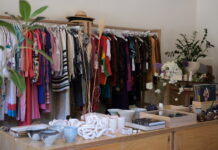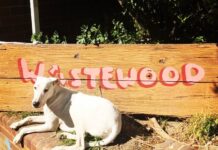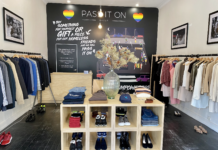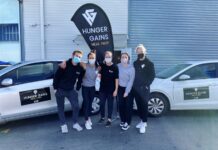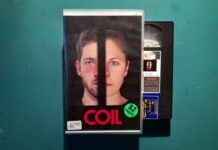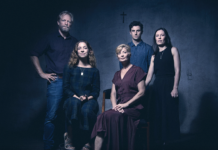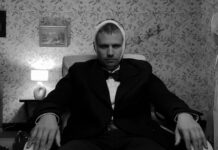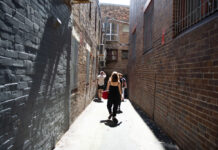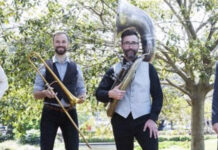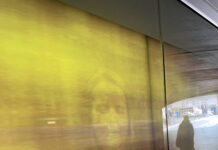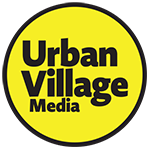The work of veteran activist, advocate and sex worker Julie Bates was recognised with an Order of Australia (A0) in this year’s Queen’s Birthday honours. But, as Julie Bates told me, this isn’t the end of her multifaceted career, it’s an added opportunity to continue her fight against injustice.
Julie Bates, AO, proudly displays her gong from the Queen and takes a sip on her Gin and Tonic upstairs at the Shakespeare Hotel in Devonshire Street.
“I’m going to use this to open more doors to fight injustice” she says.
“There’s still some unfinished business.”
Where some people might view an AO as a postscript to a career full of achievement, “The Dame”, as she is known to friends, sees it as a catalyst for expanding upon her activism as a lobbyist for sex industry law reform, urban planning, journalism and even performance art.
Specifically, her projects are to finish the process of decriminalising sex work which began in NSW in 1979, and extend that to the area of anti-discrimination protection and an improved legislative framework.
“There are still some archaic anomalies which need fixing,” she says.
“In terms of discrimination it’s still hard for sex workers to get a loan, rent premises, let alone have your child’s teacher or your family and friends find out you are a sex worker.
“Try sharing your occupation at a dinner party or in the doctor’s surgery and wait for the gaping mouths and oohs and ahhs.
“I do it these days for the shock value but I have nothing to lose my children have grown up and the company I keep is mostly made up of social justice allies.
“However, this is still not the case for the majority of people who work in the sex industry.”
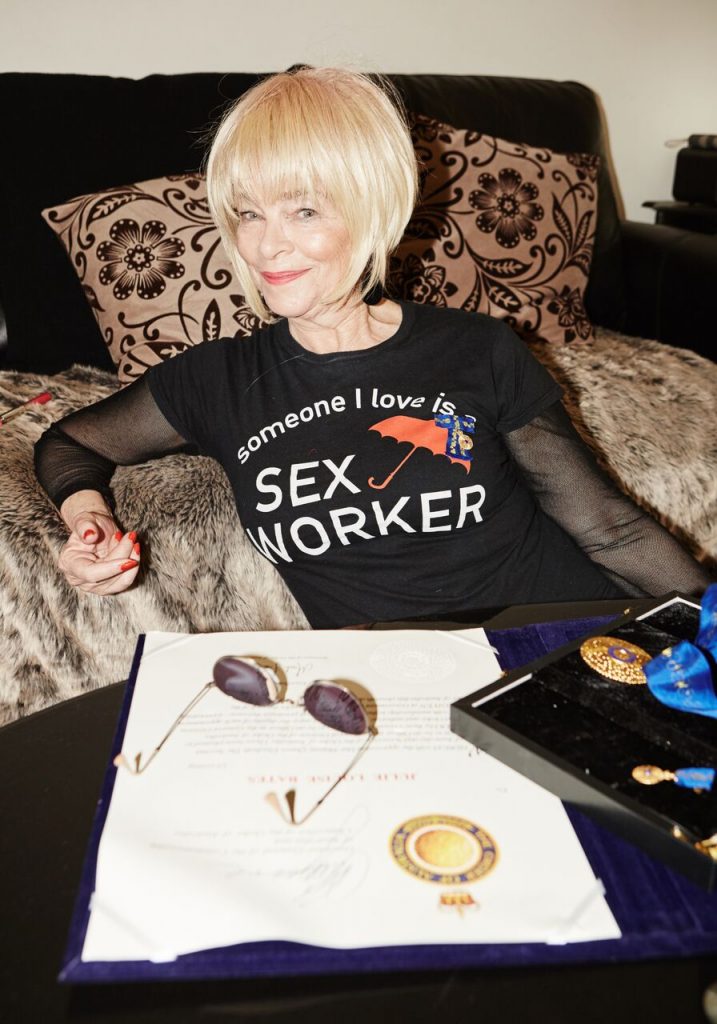
As a lobbyist for decriminalisation and a workable regulatory framework for the sex industry, Bates remains vigilant.
Angered about planning regulations which push sex services into industrial areas, she’s busily engaging with the State Government, planning authorities and colleagues for change.
“Think about it, placing sex services premises in industrial zones that are deserted at night is clearly an unsafe environment for a female workforce,” she says.
“Some councils have sought to prohibit sex industry land use entirely and the majority have, through their planning regulations, prohibited the home-based sector, that is people working quietly and privately from their homes.”
Bates is also a lobbyist for anti-discrimination protection because decriminalisation alone does not provide sufficient protection for sex workers.
One of her pet hates is against a new push for Australia to implement the so called “Nordic model”, which criminalises the clients of sex workers and people who enable their work, such as landlords who rent them premises. This model, says Julie, has led to serious harm and the death of sex workers.
“If your client is about to get arrested, it leaves you little time to negotiate your services, get a sense of safety or otherwise and generally make informed choices about proceeding with a booking,” she says.
And she’s also plugged into a national and international movement advocating for the rights of sex workers with decriminalisation being at the forefront of the global struggle.
“In Australia, we have a mishmash of laws from decriminalisation in NSW to licensing in Queensland and Victoria to prohibition in WA and SA,” says Bates.
“Under licensing regimes or ‘legalisation’ as some call it, sex workers are licensed like dogs and cats in Victoria and not able to work from their homes or other private workplace and in Queensland they must work alone.”
Bates’ drive comes from a passion for social justice she acquired at a young age and from her own life experience.
As a pregnant teenager in Melbourne, she hid from her parents and friends and told them she was going on a “working holiday” interstate.
Instead, she moved two suburbs away into a boarding house and had her baby who was then placed into adoption.
“It was a horror show from the birth through to the treatment dished out to single mothers on the ward,” she says.
“You had no voice and no rights, no ability to raise that child even if you wanted to.
“There was stigma and discrimination, and at the time, without having the words to describe how I was being treated, I just knew that it was so fucking wrong.”
From there, she worked her way up to working as a law clerk for a Melbourne law firm which represented sex workers who had fallen foul of the law, brothel owners and drug users and dealers.
“At the time, a government inquiry into corrupt police was in train and my job was to take statements from these aggrieved people, people who had complaints against the treatment they received at the hands of the police from being ‘verballed’ to having guns and drugs planted on their premises,” says Bates
“It taught me a hell of a lot about the imbalance of power relationships and what was happening on the street.”
At this point, Bates says she was “joining the dots” and understanding the dynamic of discrimination and marginalisation and how it was entrenched by obsolete and moralistic laws.
In 1981, she moved to Sydney just as HIV was beginning to have an impact in Australia.
It was here that she met and was inspired by the work of Alan Winchester, who was instrumental in providing support services to people who were falling through the cracks as mental health services de-institutionalised in NSW. “Alan was my social justice soulmate” she says.
Alan and Julie formed a relationship and went on to be co-founders of ADIC (The AIDS Drug Information Collective) which later morphed into NUAA (The NSW Users & AIDS Association) for which Julie was the inaugural manager/CEO and Alan its first President.
“I’d also started doing some sex work by then, and had tested the waters so to speak while still in Melbourne,” she says.
“I was paying off a mortgage, so I thought I’d pop into the local massage parlour and see what was on offer.”
While the work itself was palatable enough, she was shocked by the lack of training and occupational health and safety in sex work.
“In those days, before any representation or funded sex worker organisations, sex workers took on a peer support role and provided their own form of education, but it was still pretty thin,” says Bates.
After a time in Sydney and experiencing the controls and police involvement in brothels, she chose street work over brothel work.
in street work you could use condoms but they were used as evidence in massage parlours that the premises were in fact an illegal brothel. She preferred the flexibility of setting her own hours on the street, where she eventually made the corner of William and Bourke Streets her own.
“However, there was a hierarchy,” she says.
“You needed to pay your dues. When I arrived there at first on Liverpool Street, the strip between Bourke and Darley Streets was shoulder to shoulder with sex workers, with our safe houses to take clients in two or three of the big old terraces along the street.
“In being moved down to the end of the street I found myself working alongside trans women where, again, I was fiercely questioned as to why I was on their patch until one of them laughed and said ‘she’s no competition’ so they let me work there, and I learned lots from them, some of whom became friends.”
It was also a period when her advocacy turned to activism as she became a cofounder of the resurrected Australian Prostitutes Collective which later morphed into the Sex Workers’ Outreach Project (SWOP), an organisation which endures to this day.

But perhaps her biggest achievement was her successful push to have safe sex adopted in NSW brothels.
“Condoms were police evidence if they were found in brothels that were masquerading as massage parlours to get around the law,” says Bates.
“But HIV was here, and we needed to alert sex workers about this new infection that could kill you.
“And the industry was also at an all-time low because of the fear of HIV with sex workers being scapegoated.”
Bates famously persuaded the proprietor of one of Sydney’s biggest brothels, the Nevada in Kings Cross, to allow condoms to be available and used on the premises. The owner declared that clients who refused to abide by the house safe sex rules would be shown the door.
It was a move which not only created huge publicity and boosted business, but began a move to safe sex which has been credited with limiting the impact of HIV in Australia, where there have been no recorded transmissions from sex workers.
As Julie’s great friend Professor Basil Donovan, the head of the Sexual Health Program at the Kirby Institute, told Fairfax Media, the move probably saved thousands of lives. If for nothing else, that is deserving of an AO.
At the core of Bates’ worldview is the belief that sex work is work and should be treated just like any other.
And in an enlightened and civilised society it is work which should be unmolested by the law and not discriminated against. We are not there yet, she says, and that is why her work is incomplete.
“There is so much violence in the world with people having no regard for others but we sex workers are making love and not war, so why not a little more respect” says Bates.
“If you don’t decriminalise sex work you don’t care about the people who do it, and if you think about it, we are your mothers, sisters, brothers, fathers and daughters who surely deserve better treatment under the law and in society.”

